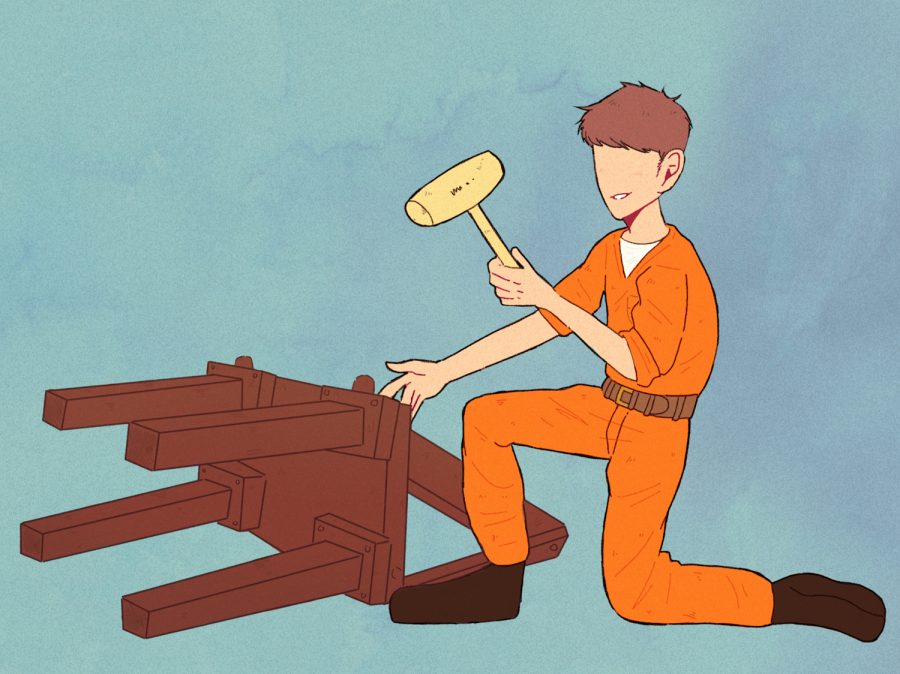Study finds Correctional Industries provides work opportunities for incarcerated prisoners
Faith Lutze’s research concludes CI increases employment after release
NESSA ANKNEY | DAILY EVERGREEN FILE
A WSU researcher surveyed prisoners employed in Correctional Industries and found the organization helped develop work ethic and job skills for reentry into the workplace after incarceration.
April 29, 2022
This article is a follow-up to a previous Evergreen article about Correctional Industries.
Washington State Correctional Industries offers voluntary employment and compensation for incarcerated prisoners in the state of Washington. While WSU has a contract with CI, it has not purchased items from the organization since 2018.
CI is managed by the Washington State Department of Corrections and is committed to helping prisoners develop a positive work ethic while maintaining and expanding work training programs that help develop job skills for reentry after their time in prison, according to CI’s mission statement.
WSU is able to purchase furniture from CI because of a contract, said Faith Lutze, a professor for the WSU Department of Criminal Justice and Criminology. However, so are other public universities and state governments.
Lutze conducted research at CI as the principal investigator and came to the conclusion that CI “reduces recidivism, improves institutional behavior and increases employment after release,” according to a research brief published in 2015.
“I spent two years at Airway Heights Correctional Center, and I had an office located within that facility,” Lutze said.
Lutze, along with co-principal investigator Laurie Drapela and research associate Roger Schaefer, surveyed and interviewed the incarcerated workers and CI staff members. They also observed how the work was done and examined the environment of the facility.
Lutze said Airway Heights was not a furniture facility but focused on food production and food services.
Airway Heights also focuses on optical manufacturing, textiles, warehouse services, commissary, laundry services and admin services, according to the CI website.
“The food factory produces food that is then distributed throughout the prison system, and also outward to the community depending upon what their contracts are,” Lutze said.
Among the 13 correctional facilities where CI operates, Stafford Creek Correctional Center, located five miles west of Aberdeen, Washington, has a furniture factory, according to their website.
In addition, incarcerated employees at Cedar Creek Corrections Center install new furniture, according to their website.
At WSU, facilities on campus such as the libraries used CI’s services for furniture reupholstering, but that was done almost 15 years ago, said Beth Blakesley, associate dean of libraries.
“We had some furniture reupholstered, and it was either in 2007 or 2008. So yeah, it was the first time that we had done that,” Blakesley said.
At the time, it was explained to her that CI was an employment program for incarcerated prisoners in the state, and it was training them for a career, she said.
“We went with CI because they were low-bid,” she said, “So with the reduced labor cost, CI would have come in with the lowest bid compared to a private upholsterer.”
Blakesley said they had lounge chairs and ottomans reupholstered, which are still on campus today in Holland and Terrell Libraries.
When prisoners join CI voluntarily for work, they get paid and there are many other benefits as well, Lutze said.
“They are paid more than other jobs in prison,” she said. “Oftentimes [the savings] helps them to pay for housing when they get out of prison or transportation or a car. Many times men are sending money home to support families.”
Lutze said the prisoners also can purchase personal items from the commissary, a store within a correctional facility.
According to the CI Work Programs, workers are paid at different levels. If an incarcerated employee is a level one, they are compensated from $0.70 to $0.80 hourly, and the highest level is a level four with a compensation rate from $1.40 to $1.70 hourly.
“There’s also something called legal financial obligations, which are costs that are affiliated with the court process and the criminal justice process. Sometimes those are thousands of dollars of debt that a person is stuck with when they are released,” Lutze said. “But Correctional Industries has a system in which [the prisoners] are helped to pay that off, so what they earn pays off those LFOs.”
CI also offers classes about financial management, savings, investing, how to be successful within the workplace, solving conflict and working with supervisors, she said.
“The workers, you know, they really experienced a positive organizational culture. They felt supported socially and relationship-wise, in terms of building work relationships, and just being able to cope with the prison environment more effectively,” Lutze said.
During their research, she said they found the CI staff cared for the incarcerated workers and they wanted to provide a safe, secure and professional work environment.
“The incarcerated workers were also grateful for the staff that cared about them,” Lutze said.
Lutze said she realized CI may be controversial and concerning for people when they are thinking about how labor is conducted and paid for within a prison setting. However, through her study, she found a positive environment among the incarcerated workers and the staff for the Department of Corrections.
“What we learned was that oftentimes the men in our interviews said it’s as if they’re not in prison, that they feel more human when they’re in Correctional Industries,” she said. “They feel like they have a purpose, and they feel supported in that purpose.”










